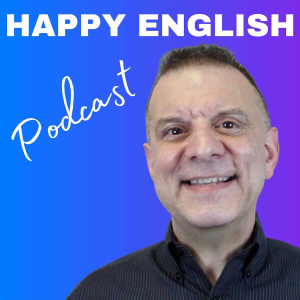
Happy English Podcast
Language Learning Podcasts
Learn American English with your host Michael DiGiacomo from Happy English in New York City. Michael has been teaching English since 1994. This is an English as a Second Language (ESL) and English as a Foreign Language (EFL) podcast that brings you fun, practical, and useful English lessons which are ideal for intermediate and advanced level English learners everywhere. This podcast is perfect for university students, business professionals, homemakers, retirees and anyone who is interested in learning and improving their English skills. Every week, you are going to learn American English idioms, conversational expressions and phrasal verbs. As your American English teacher, I will help you learn real and natural American English pronunciation and conversational style. You will get the chance to improve your vocabulary and have a clear understanding of practical English grammar. I also help you have a deeper understanding of American Culture through language learning. Join my podcast learner's study group to practice these lessons with me each week on zoom. Get Happy, Get English. Happy English!
Location:
United States
Genres:
Language Learning Podcasts
Description:
Learn American English with your host Michael DiGiacomo from Happy English in New York City. Michael has been teaching English since 1994. This is an English as a Second Language (ESL) and English as a Foreign Language (EFL) podcast that brings you fun, practical, and useful English lessons which are ideal for intermediate and advanced level English learners everywhere. This podcast is perfect for university students, business professionals, homemakers, retirees and anyone who is interested in learning and improving their English skills. Every week, you are going to learn American English idioms, conversational expressions and phrasal verbs. As your American English teacher, I will help you learn real and natural American English pronunciation and conversational style. You will get the chance to improve your vocabulary and have a clear understanding of practical English grammar. I also help you have a deeper understanding of American Culture through language learning. Join my podcast learner's study group to practice these lessons with me each week on zoom. Get Happy, Get English. Happy English!
Twitter:
@happyenglishny
Language:
English
Contact:
5165824181
Website:
https://www.myhappyenglish.com/
Email:
happyenglishny@gmail.com
892 - How to Say Because Without Saying Because
Duration:00:09:25
891 - Sunday Speak - How Come
Duration:00:01:51
890 - Saturday Short - Negative Questions
Duration:00:01:54
889 - Friday Phrasal Verb - Slack Off
Duration:00:01:58
888 - Tag Questions & Negative Questions
Duration:00:07:20
887 – How to Use Unless, As Long As, and In Case
Duration:00:09:10
886 - Have Got vs. Have- What’s the Difference
Duration:00:09:25
885 - Sunday Speak - Gotcha
Duration:00:02:02
884 - Saturday Short – By The Way
Duration:00:01:46
883 - Friday Phrasal Verb - Mull Over
Duration:00:02:01
882 - Fall Vocabulary in American English
Duration:00:10:40
881 - Speaking Naturally - How Native Speakers Break Grammar Rules
Duration:00:10:44
880 - Seven Ways To Use Even In English
Duration:00:12:10
879 - Sunday Speak - Polite Ways to Say No
Duration:00:02:07
878 - Saturday Short – Everyday vs. Every Day
Duration:00:01:46
877 - Friday Phrasal Verb - Toy With
Duration:00:01:56
876 - Using Say, Tell, Was Like, and Go
Duration:00:10:41
875 - Expressions with Time in Everyday English
Duration:00:09:54
874 - American Politeness – Indirect Ways to Say Things
Duration:00:09:36
873 - Sunday Speak - You Bet
Duration:00:02:01